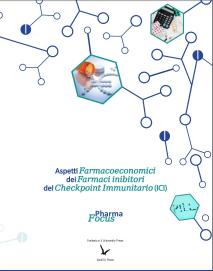Pharmacoeconomic aspects of Immune Checkpoint Inhibitors (ICI) drugs
Keywords:
Pharmacoeconomics, Inhibiting Drugs of the Immune Checkpoint, PharmacoutilizationSynopsis

Publishers: FedOA - Federico II University Press
Series: Pharmàkon
Pages: 72
Language: Italian
NBN: http://nbn.depositolegale.it/resolver.pl?nbn=urn:nbn:it:unina-30249
Abstract: Personalized medicine represents a notable advance in medical practice, as it allows treatments to be adapted to the genetic and phenotypic characteristics of patients. This approach is particularly consolidated in oncology, where it has revolutionized clinical practice. Personalizing treatment based on patient and tumor characteristics offers significant benefits, including greater clinical benefits, a different toxicity profile compared to conventional treatments, and a reduction in the risk of therapeutic failure. The adoption of personalized oncology drugs, based on the identification of genetic and molecular biomarkers, marks a crucial turning point. Innovative technologies such as Next Generation Sequencing allow extensive tumor profiling with a single test, improving the effectiveness of treatment, reducing side effects and prolonging survival. However, this approach involves high costs, not only for drugs but also for genomic profiling. It is necessary to evaluate the economic impact of personalized medicine, considering the relationship between costs and benefits for the patient and the overall sustainability for the healthcare system. Cost-effectiveness and budget impact analyzes play a key role in ensuring that additional costs are justified by the clinical benefits. A relevant example is immunotherapy with Immune Checkpoint Inhibitors, used for various types of cancer. These drugs, which bind specific targets, are potentially useful in profiling cancer patients and tumors, but involve high costs.
Downloads














